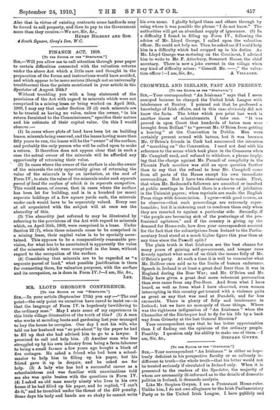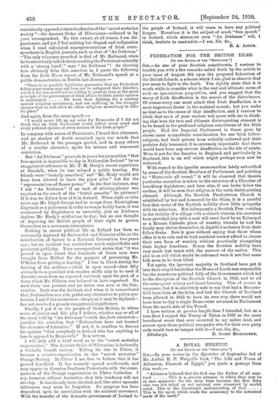[To rss EDITOR OF THE "SPECTATOR. " ] SIR,—Your correspondent "An Irishman"
is either so hope- lessly deficient in his perspective faculty or so callously in- different to truth—the whole truth—that his letter would not be treated seriously if circulated in Ireland only. When it is presented to the readers of the Spectator, the majority of whom are necessarily ill-informed as to the details of domestic politics in Ireland, it demands analysis.
Like Mr. Stephen Gwynn, I am a Protestant Home-ruler. Unlike him, I do not owe allegiance to the Irish Parliamentary Party or to the United Irish League. I have publicly and consistently opposed certain tendencies of the " secret sectarian society "—the Ancient Order of Hibernians—referred to by your correspondent. To this extent, at all events, I am dis- passionate, and yet I feel nothing but disgust and indignation when I read calculated misrepresentations of Irish corre- spondents in English journals, such as that of "An Irishman."
" The only tolerance preached is that of Mr. Redmond, when he bombastically talked about crushing the Protestant minority with a ' strong hand," says " An Irishman " ! As showing
how obviously false this assertion is, I quote the following from the Irish Times report of Mr. Redmond's speech at a public demonstration in Dublin last January:— " There is no possible legislative guarantee that my Protestant -fellow-countrymen may ask from me to safeguard their liberties, which I, for ono, would not be willing to grant so long as the great principle of the government of Irish affairs by Irish public opinion IS maintained We have been fighting for a century against religious ascendency, and our suffering in the struggle ensures that we will allow no other religious ascendency to take its place."
And again, from the same speech :-
" I would never lift up my voice for Home-rule if I did not think that an Irish Parliament would reflect every creed and every political opinion of every section of the Irish people."
In company with scores of Protestants, I heard this utterance, and no shadow of doubt remained upon our minds that Mr. Redmond in the passages quoted, and in many others of a similar character, spoke his intense and innermost conviction.
But " An Irishman " proceeds to prove his proposition " that
free speech is impossible to-day in Nationalist Leland" by an exaggerated reference to Mr. T. M. Healy's recent experience at Dundalk, when he was refused a public hearing. His
friends were " brutally assaulted," and " Mr. Healy would not have been allowed to leave the place alive" but for the
" representatives of Saxon power." In the first instance, may I ask "An Irishman" if an inch of sticking-plaster was required as the result of the "brutal assaults" he pictures P
If it was, we did not hear of it in Ireland. When eight or nine years ago Mr. Lloyd George had to escape from Birmingham disguised as a policeman in order to escape bodily harm, it was condemned by Englishmen as unworthy, just as Irishmen deplore Mr. Healy's misfortune to-day; but no one thought of depriving the British people of their right to govern themselves as a necessary consequence.
Nothing in recent political life in Ireland has been so universally deplored by Nationalist and Unionist alike as the introduction of batons to a National Convention two years ago ; but no incident has received so much unjustifiable and persistent publicity. Your correspondent states that "it was proved in open Court that hundreds of baton men were brought from Belfast for the purpose of preventing Mr. O'Brien from getting a hearing." I was in Court during the hearing of the evidence—which is upon record—that fifty stewards were provided with wooden staffs only to be used if disorder arose from an expected outbreak upon the part of a force which Mr. O'Brien was believed to have organised. No such force was present, and no baton was seen at the Con- vention. Such was the incident, and when it is remembered
that Nationalists as a rule prefer any alternative to police pro- tection, I ask if the occurrence—deeply as it may be deplored—
has not received a grossly exaggerated significance.
Finally, I put it to the people of Great Britain, in whose sense of justice and fair play I believe, whether any or all of the story told by "An Irishman "—with the facts corrected— justifies his assertion that "Nationalists have not learned
the elements of toleration." If not, it is needless to discuss his opinion "that everybody in Ireland who has anything to lose is opposed to Home-rule." It is untrue.
I will only add a brief word as to the "secret sectarian organisation." The Ancient Order of Hibernians is declaredly a Catholic benefit society. Taking its rise in Ulster, it became a counter-organisation to the "secret sectarian"
Orange Society. In Ulster I am free to believe that it has proved beneficial. It has recently spread southwards, and may appear to threaten Southern Protestants with the conse- quences of the Orange organisation to Ulster Catholics. I
say, however, without hesitation that this tendency will not develop. It has already been checked, and, like other Sporadic influences, may *soon be forgotten. Its progress has been dependent upon its association with the national movement.
With the transfer of- the domestic government of Ireland to the people of Ireland, it will cease to have any political danger. Meantime it is the subject of much "free speech" in Ireland, which statement even "An Irishman" will, think, hesitate to contradict. —I am, Sir, &c., B. A. Anois.











































 Previous page
Previous page